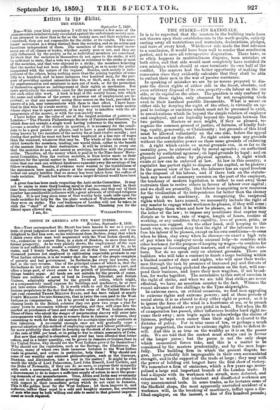COTTON IN at,IFFETVA AND TUE WEST INDIES. Brixton, September 8,
1859. Sin—Your correspondent Mr. Strutt has been known to me us a magis- trate of great judgment and integrity for above seventeen years, and I sin delighted to find him now, on his retirement from Berbiee, doing that which I think every other man well acquainted with the West Indies should do, viz., endeavour to restore them, m a state of freedom, to more than their former prosperity. As he very plainly shows, the employment of the men alone is not sufficient to render a country prosperous ; and if it be, as he states, and I firmly believe, that there are at this time several hundred thousand persons not employed in cultivating exportable products in our West Indian colonies, it is no wonder that the mass of the people complain of poverty and bad government. In Barbados, las every oue knows, the fact is the very reverse. One of the principal causes of which is, that the Barbadians do not rely alone on a sugar crop, but appropriate a part, and often a large part, of every estate to the growth of provisions, and other things besides sugar. Ali lands are not suitable for the growth of canes. There are millions of acres of land in Jamaica, Trinidad, and British Guiana, admirably adapted for the growth of cotton, which might, at a comparatively small expense for 'buildings and machinery, be at once put into cotton cultivation. It is worth while to call the attention of Ja- maican proprietors to the fact that the cotton crop of the United States the last year exceeded TURES Mriason BALEs, aud has been valued at nearly Poierv MILLION POUNDS STERLING, that is twice the sum paid to the West Indians as compensation. Let. it be proved to the Americana that by pur- chasing lands in the British colonies they can grew two crops a year for many years in succession without replanting, and they will come into the market as purchasers of land and restore the value of West Indian estates. Those of them who admit the danger of perpetuating slavery will enter into arrangements with their slaves to remove them to Jamaica or Guiana, they consenting to work for their old masters for a certain time under contracts as free labourers. A successful example once set will gradually cause a general adoption of this method of employing capital and labour profitably,— far more profitably than either in keeping up the stock of slaves by purchase at the rate of 2001. per head, or in going to war to obtain possession of Cuba. But now that capital is abundant, and proof has been afforded that better cotton, and in a larger quantity, can be grown in Jamaica or Ciuiana.than in tie United States, why should not the West Indians grow it for themselves ? Why should not the capitalists, such as the Baring, the Gladstones, the Cavens, many of whom owe their immense fortunes to the West Indian trade in general, and cotton in particular, help than ? Why should not some of our wealthy and eminent philanthropists, such as the Gurneys. Buxton, and Alexanders, tale a lead in the matter ? It might be even worth the while of Lord Palmerston, Lord John Russell, Lord Carlisle, and the Duke of Newcastle, if they can do no more, to express their sympathy with such a movement, and their readiness to do whatever it is proper for a Government to do to insure a sufficient supply of cotton to meet the grow- ing demands of our manufacturers. True, Africa and India may eventually turn out to be profitable cotton-growing countries; but there are obstacles with respect to their immediate action which do not exist in Jamaica. This is the golden hour for the West Indiana; let them improve it, and welcome, rather than repel in a cold and haughty manner, the overtures of men who may be both willing and able to assist in that general improve-
ment so much required. B.


























 Previous page
Previous page